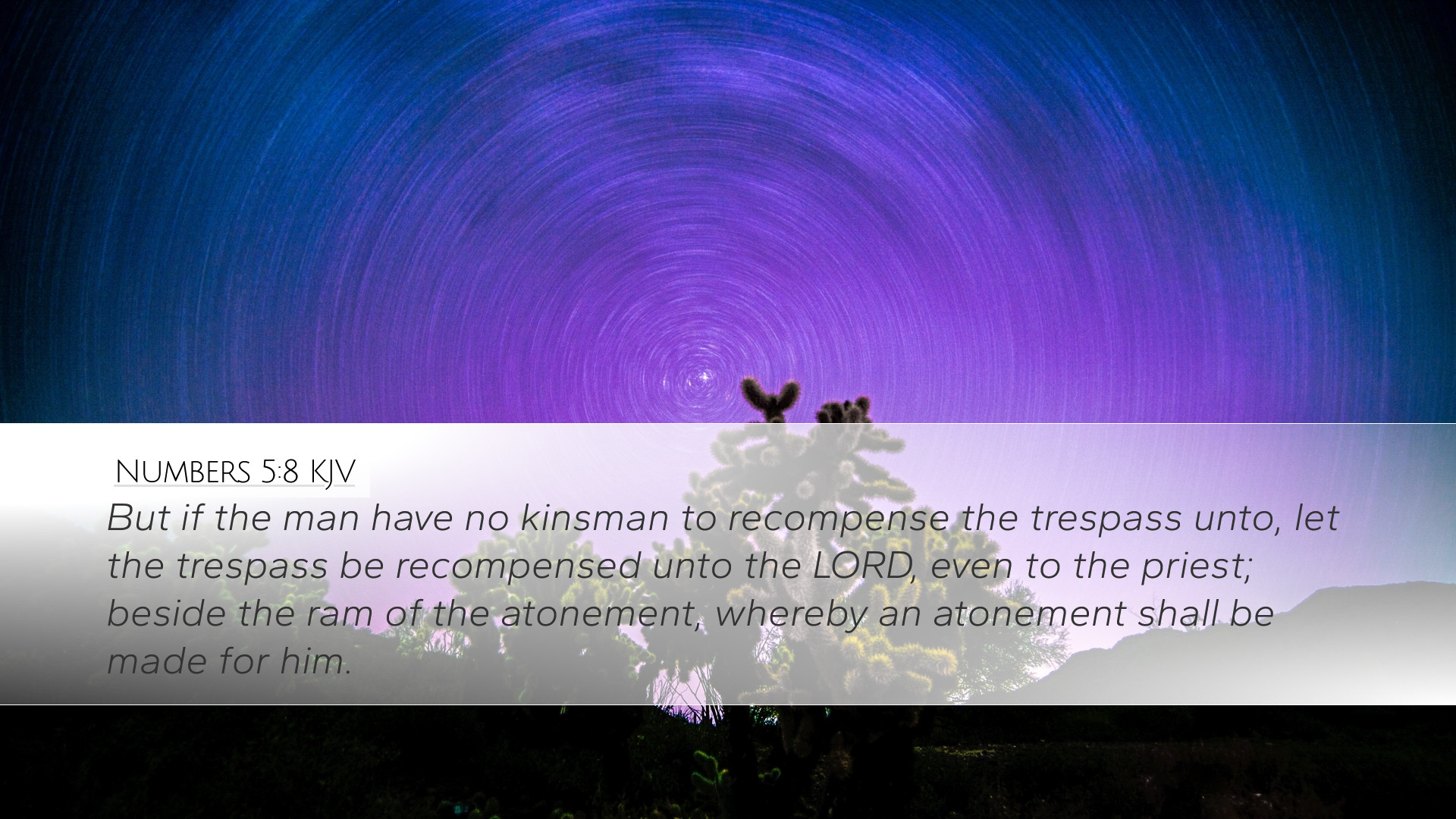Commentary on Numbers 5:8
Introduction
Numbers 5:8 states: "But if the man have no kinsman to recompense the trespass unto, let the trespass be recompensed unto the Lord, even to the priest; beside the ram of the atonement, whereby an atonement shall be made for him." This verse is a part of the Laws regarding the treatment of wrongs done to others and highlights the importance of accountability and restitution in the community of Israel. The intricacies of this verse warrant a deeper theological study to appreciate its implications for both ancient Israel and contemporary believers.
Contextual Background
The Book of Numbers outlines the journey of the Israelites as they traverse from Egypt to the Promised Land. In chapters focusing on purity and justice, this verse speaks to restitution and atonement regarding violations of social ethics. God establishes precise regulations to maintain a holy community.
Exegesis of the Text
Analysis of Theme: This verse revolves around the theme of restitution. It emphasizes that when a sin is committed, especially one that harms another individual, the perpetrator is required to face consequences and restore what was lost or taken. However, in cases where a direct restitution is impossible—such as when a victim is not available or lacks a close relative—the sin is ultimately addressed as a transgression against God.
Matthew Henry's Insights
Matthew Henry emphasizes the significance of reconciliation. He asserts that every injury done to a fellow human must be rectified, as these acts are relational and communal. If restitution to the individual is not possible, the offender is to bring a ram as an offering to the Lord, signifying that the altar of God is a place where injustices are acknowledged and rectified.
Albert Barnes' Reflections
Albert Barnes points out that this provision underscores God’s justice and grace. It conveys the idea that while direct restitution to the human victim is essential, ultimately, all wrongs are against God. Hence, those wrongs must be addressed through offerings to priests, reconciling the sinner with God through sacrificial atonement. Barnes notes that this principle illustrates the larger biblical narrative of atonement, where human wrongdoing leads to divine reconciliation.
Adam Clarke's Commentary
Adam Clarke provides a detailed consideration of the social implications tied to this verse. He notes that societal order hinges on the restoration of relationships. If a man lacks a kinsman, he is still accountable to God. Clarke emphasizes the seriousness of sin and the duty of individuals to seek restoration, either with affected parties or with God Himself in the absence of a direct relationship.
Theological Implications
The broader theological insight from Numbers 5:8 indicates that God calls His people to live in harmony, actively seeking the welfare of others. It illustrates the communal aspect of sin and the importance of communal restoration. The verse articulates a strong principle of responsibility, where individual actions affect the whole community.
Restitution and Atonement
At the heart of this passage is the understanding of atonement. The ram offered signifies the need for a substitute to bear the consequences of sin. This foreshadows the greater redemptive work fulfilled in Christ, the ultimate sacrifice, who takes on the weight of our transgressions.
Practical Applications for Pastors and Theologians
Restoring Broken Relationships: Pastors can utilize this verse to teach about the necessity of restoring broken relationships within their congregations. This scripture highlights the importance of addressing grievances promptly and seeking reconciliation.
Encouraging Accountability: This passage invites leaders to foster environments of accountability within their ministries. Encouraging congregants to own their misdeeds and seek restitution can lead to an empowered, unified church community that mirrors God's justice.
Exploring Atonement: The symbols of atonement can be explored in preaching and teaching. This lays the groundwork for discussions on Christ’s work on the cross, highlighting how the sacrificial system pointed forward to His redemptive act.
Conclusion
In conclusion, Numbers 5:8 serves not only as a legal requirement for restitution within ancient Israel but also resonates with timeless principles of accountability, community, and divine justice. As scholars and faithful leaders reflect upon this verse, they are encouraged to consider how these ancient laws inspire contemporary practices of reconciliation and atonement in their communities and personal lives.


